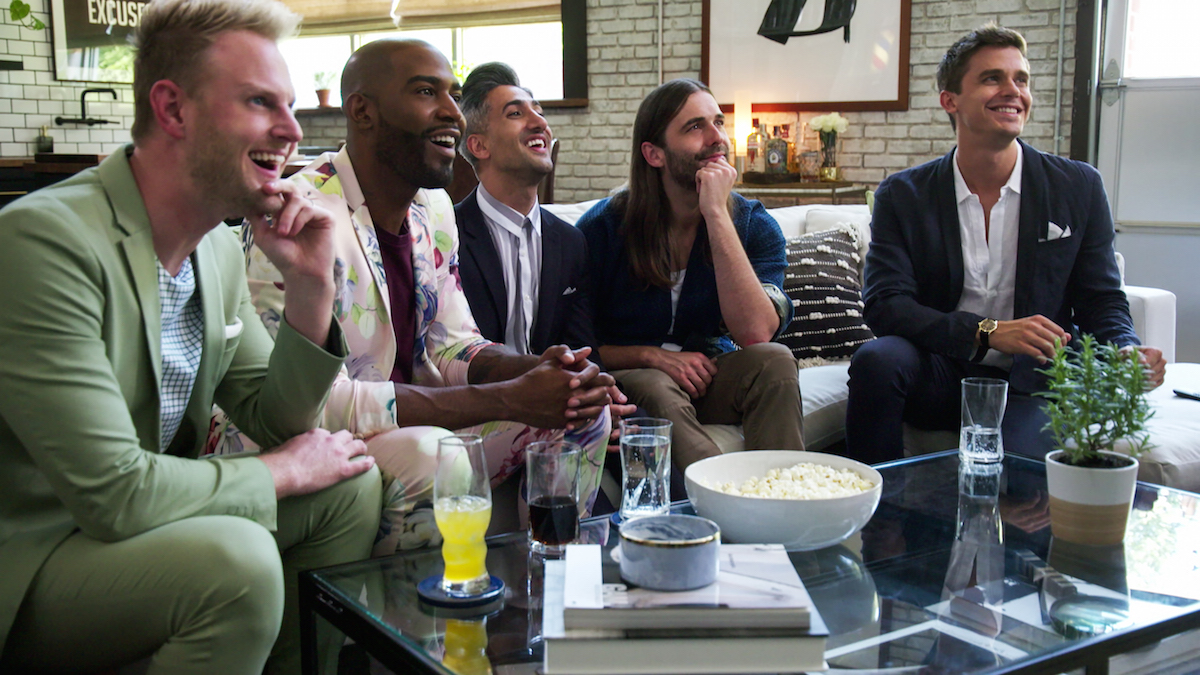In season one of the Queer Eye reboot, the Fab Five met men of Atlanta and the surrounding suburbs in an effort to improve their lives. While I’m sure many viewers were able to see this as apolitical entertainment, for others, the elephant in the room was the knowledge that a number of these men and their families were likely staunch Republicans who had voted for Trump and support an administration that has actively targeted the LGBTQ and other marginalized communities.
In a recent video interview with Vulture, featured above, the guys say they’re “not good at keeping [their] opinion to [them]selves,” but they also explain why you don’t see them asking these men about their voting records.
As Jonathan Van Ness puts it, “When I’m in there trying to talk to you about your receding hairline or how you’ve never worn your hair in a different way or whatever, I will not probably take that opportunity to address the fact that you are probably a rabid Republican.”
Still, one of the most memorable scenes from season one was the discussion between Karamo Brown and their white police officer makeover subject about his experience with the police, in an episode where the audience witnessed him being pulled over. He says his experience on the show is the opposite of Jonathan’s.
“For me,” he says, “being the culture guy, I leaned into those moments. It was like, ‘How can we have a culturally relevant conversation in this short amount of time?’ So if it was about religion, race, politics, I didn’t mind going there. Because if you can’t get to the core of what someone’s feeling and say ‘I hear you, I see you and I respect you. Now I need you to see and hear and respect me,’ then there would have been no point in us being there.”
Food guy Antoni says they all “balance each other out” in that way. And, after all, as much as many of us would want them to use their platform to condemn the issues being pushed by a party some if not most of their subjects identify with, that’s not what the show is about. And it can be argued that the compassion they practice as five gay men reaching out to offer assistance to those people is in itself a subversive act.
The second season is now out, and my viewing party isn’t until tonight but word is it’s even less ostensibly political than the first season. However, from the sound of it, it is still all about people learning from each other’s experiences. And that goes both ways, as this season, the gang will makeover their first trans man, something that some of the guys admit they don’t have much knowledge of.
I’m beyond tired of the sympathetic Trump voter profile—all the major news outlets trying to understand this mysterious figure. But in the case of Queer Eye, the olive branch approach might actually be the best line in to having these learning experiences on both sides. Especially because it doesn’t erase those doing the extending.
“It’s about trying to see what makes you similar as opposed to what makes you different,” Jonathan says. “So I’m not going to go in and talk about what I know are going to be opposing views off the top. I’m going to look for how we can try to connect. And then after you build that connection and get to know someone, eventually I can try to have that conversation with you if I need to. But in general, when we’re trying to communicate with each other in this polarized environment, it’s like look for what you can connect about as opposed to picking a fight. Who wins by immediately going into a fight?
Food guy Bobby Berk adds, “One of the things I learned the most is to listen. When you go in there and you’re like ‘How do you feel? What do you think?’ their defenses kind of come down and they’re much more open to listening to you once you’ve heard them.”
(via Vulture, image: Netflix)
Want more stories like this? Become a subscriber and support the site!
—The Mary Sue has a strict comment policy that forbids, but is not limited to, personal insults toward anyone, hate speech, and trolling.—










Published: Jun 15, 2018 05:24 pm